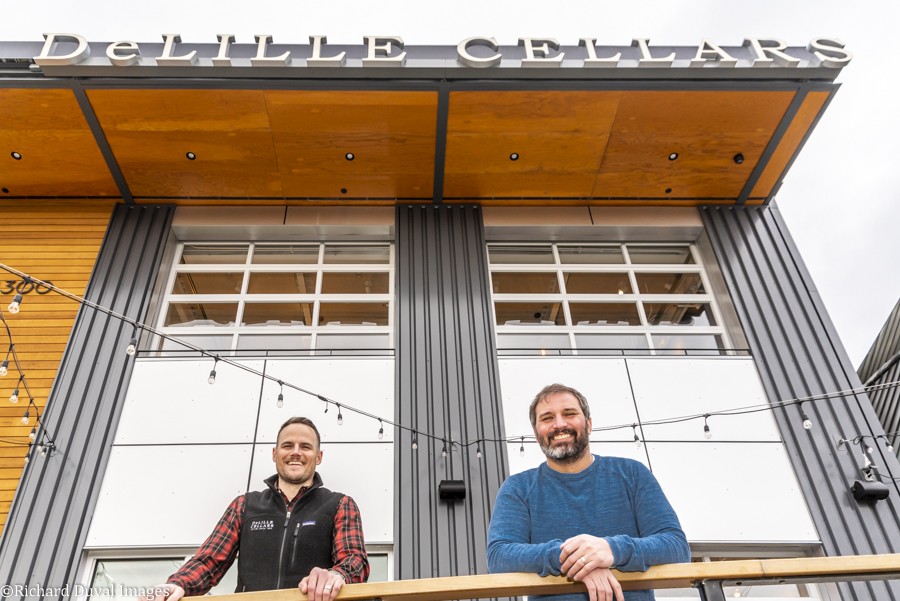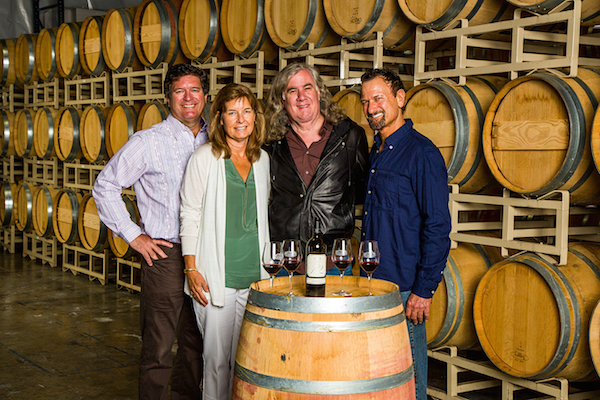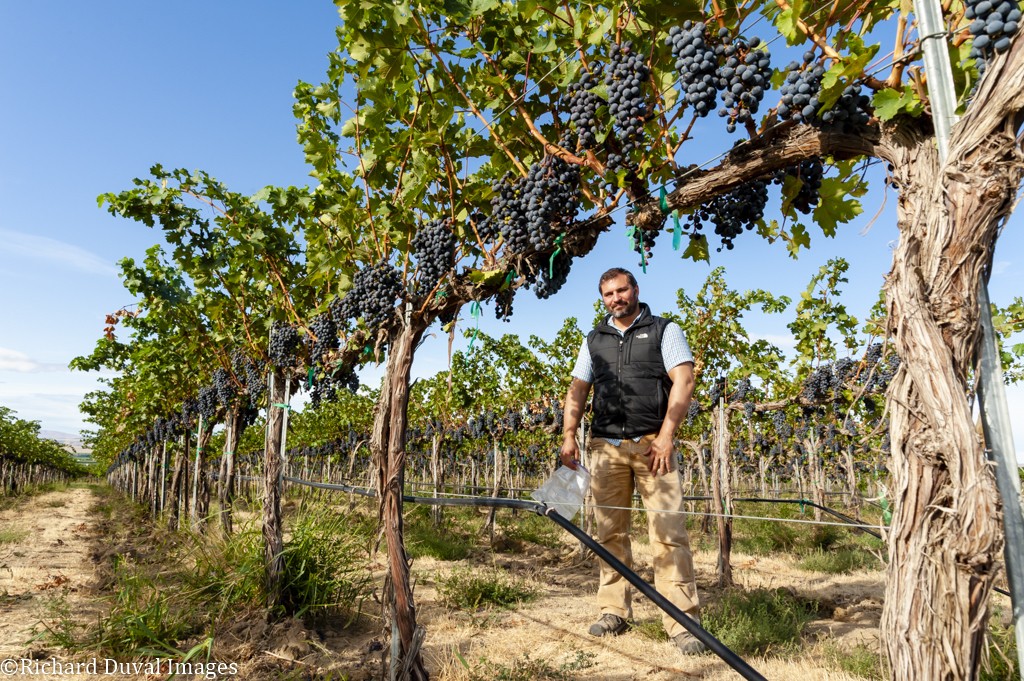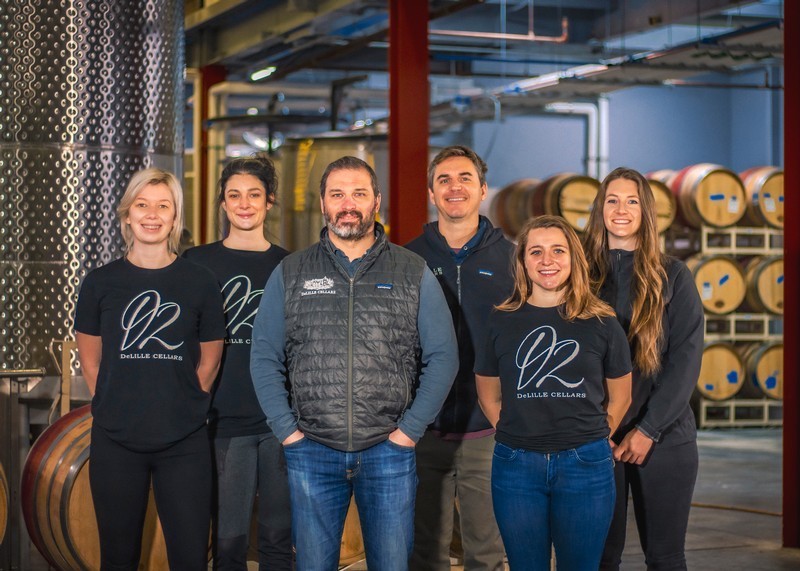
WOODINVILLE, Wash. — As DeLille Cellars celebrates 30 years of historic achievements in 2022, its storied wine program and business never have been better.
Five years ago, our team named DeLille Cellars as the 2017 Washington Winery of the Year. Now, with an impressive three-story modern chic destination and next-gen leadership from winemaker Jason Gorski and CEO Tom Dugan, DeLille Cellars stands as Great Northwest Wine magazine’s Pacific Northwest Winery of the Year for 2022.
The horizon seems to be lit with continued greatness as they add to the legacy of their winery’s founders, who partnered early on with many of the state’s top vineyards and acquired talent along the way.
“The founders are the foundation,” Gorski says. “We’re not here without them, and we operate the business for them.”
Last fall, a group of the Pacific Northwest’s leading wine buyers and sommeliers met in Hood River, Ore., and voted the DeLille Cellars 2018 Harrison Hill — a product of Cabernet Sauvignon vines planted in 1962 — as Best Red Wine for the Great Northwest Invitational Wine Competition.
The year before, The Seattle Times selected the 2019 Chaleur Blanc as its top Northwest wine — rare recognition for a white wine. An example of what Washington vines can produce, the Bordeaux blend of Sauvignon Blanc and Sèmillon was the first white wine made by founding winemaker Chris Upchurch under the DeLille Cellars brand in 1995.
“By the beginning of 2019, I was fully transitioned to the director of winemaking, but Chris still gives me unsolicited advice,” Gorski says with a chuckle.
Gorski’s versatility was on full display last fall at The Invite, where the DeLille 2020 Rosé and 2020 Chaleur Blanc also earned gold medals.
Last spring, the DeLille 2018 Four Flags, a production of Cabernet Sauvignon devoted to four Red Mountain vineyards — Ciel du Cheval, Klipsun, Upchurch and DeLille’s 20-acre Grand Ciel — achieved a double gold at the Cascadia International while the Rhône-inspired 2018 Doyenne received a gold medal.
During the “Rhône gems” tasting conducted by Great Northwest Wine for now-defunct Wine Press Northwest magazine, the 2020 Roussanne off Ciel du Cheval finished as the top white and earned a double gold. Gorski’s 2018 Signature Syrah also was awarded a double gold, while the DeLille 2019 Métier — a blend of Grenache, Mourvèdre and Syrah — added a gold medal.
Then last fall at Great Northwest Wine’s Platinum Awards, the 2018 Four Flags went Double Platinum and earned 97 points. The 2018 D2 Red Wine — which is nearly 50% from Red Mountain — also went Platinum.
A brand built with Bordeaux in mind

The first two wines created by DeLille Cellars were the 1992 Chaleur Estate and the 1992 D2, but the seeds were planted when longtime Seattle wine merchant Jay Soloff sat next to Greg Lill at a Rotary meeting in 1987. Soloff and Upchurch, a colleague in the wine trade, already had a small sparkling wine project together.
A few years before, Greg’s father, Charles, a successful businessman, acquired 10 acres along pastoral Woodinville-Redmond Road. For credibility, they hired a respected consultant — the late David Lake, a Master of Wine and the winemaker at nearby Columbia Winery. (It was Lake who urged DeLille to take over Ste. Michelle’s contract with the Newhouse family that owned historic Harrison Hill Vineyard.)
“Chris was an amateur winemaker, and Dad basically funded us to start with,” Greg Lill says. “In 1992, there was Columbia, of course the Château (Ste. Michelle), French Creek Cellars and I think Facelli started the same year as us. What’s happened in Woodinville and what Washington has grown up to become is pretty remarkable, and a lot of industry people say that we’ve helped with that.”
DeLille’s success ultimately attracted the attention of Sam Bronfman and Bacchus Capital Management, a private equity firm with offices in New York and San Francisco. His family founded the Seagram spirits and wine empire, and Sam oversaw the premium wine division until it was part of the package that sold for $8 billion in 2000. A decade later, Bacchus entered the Northwest wine industry by first investing in Oregon’s Wine by Joe operation, led by Joe Dobbes. The purchase of storied Panther Creek Cellars in Oregon and investment in DeLille came in 2013.
“Sam wanted to get back into the wine industry and was looking for great smaller brands that need expertise and capital to help them grow,” says Dugan, whose four years with Bacchus began in 2010, not long after graduating from Colorado College with an economics degree. “In the case of DeLille, here was this phenomenal brand that was highly respected in the sommelier community but not as well known — and it should be.”
Bacchus’s involvement in DeLille came with majority ownership, according to Greg Lill, a minority shareholder along with his sister, Pat Lill-Jorgenson, Upchurch and Soloff. Recently, Greg and his wife, Stacy, recast the historic home of DeLille Cellars into ultra-boutique Château Lill.
“In 2014, I was planning to leave investment banking and private equity for business school,” Dugan says. “At the time, DeLille was also looking for a vice-president of operations. When I spoke to Sam about business school, he along with Chris, Jay, and Greg, convinced me to move out to Seattle for a year to help them at the winery.
“That one year turned into what will be eight this August, and included becoming GM and COO before Greg stepped down,” added Dugan, who now also sits on the Washington’s National Park Fund board of directors.
A real-estate company purchased the 20-acre former home of Redhook Brewery for $24.5 million in 2017. The next year, DeLille Cellars and Sparkman Cellars boldly announced plans to move in, with Dugan overseeing the 30,000-square-foot remodel to accommodate Gorski’s annual production of 30,000 cases and create an experience for visitors.
The synergy sparked by DeLille’s success near the languid Sammamish River has inspired others. This past winter, Fidélitas, Latta, Long Shadows Vintners and Mark Ryan said they will open tasting rooms across the parking lot from the former brewery. The entire campus is across the street from Château Ste. Michelle, tucked among three icons — the Herbfarm Restaurant, Willows Lodge and Columbia Winery.
“All of the founders have been very active as owners, but most recently, less so in day-to-day operations with our move to Redhook,” Dugan said. “I think they’ve all enjoyed the growth and success, and I’ve always felt pretty honored that they felt comfortable to step back and hand the reins over to us.”
From one Garden State winemaker to another

While Gorski and Upchurch grew up in New Jersey, they came from different backgrounds.
“His dad was a nuclear engineer and wine was part of his upbringing,” Gorski said. “Not me. I grew up in the farmlands.”
Wrestling got Gorski into Duke University, where he finished third at the Atlantic Coast Conference championships as a freshman and became team captain. Toughness and perseverance served him well after he fractured his jaw as a sophomore and broke his neck during his campaign as a junior.
“I had one relatively healthy season, but I earned two degrees in four years while working 30 to 40 hours a week to pay for books and feed myself,” Gorski said.
Along the way, he worked at a family-owned farm where wine was served with supper.
“It was part of their family ritual,” he says. “At the age of 19, I was in charge of picking the right wine for dinner, and it was always French — because we were on the East Coast. I started to learn as much as I could about wine and thought about it as a career because I’ve always enjoyed making things with my hands.”
Upon graduation in 2002, he turned his biology degree into a winemaking job at Four Sisters Winery in New Jersey. Romance led him to Washington state, where he interviewed at Hedges Family Estate to be assistant winemaker but landed on the white wine team at Château Ste. Michelle. After four years in Woodinville, he spent three years in Walla Walla with Serge Laville at Spring Valley Vineyard, another Ste. Michelle brand.
In 2011, the long line of assistants who departed from DeLille to earn acclaim with their own projects ended when Upchurch hired Gorski to replace Chris Peterson, who went on to fame with Avennia and Passing Time.
“(Upchurch) always said, ‘When you join the winemaking team, you are here to contribute, not just perform work orders,’ ” Gorski says. “Everybody brings something to the table. I think that’s the most important characteristic at DeLille — the culture of craftsmanship, working together, treating the wines as if they are your own and honoring the legacy of people who have come through here.”
When asked about some of the best wines he’s made at DeLille, Gorski answers quickly.
“One that really sticks out is the 2011 Chaleur Blanc,” he says. “It had been a few years since I worked with Sauvignon Blanc, and it was a really challenging vintage, but that wine is always a standout. I took satisfaction in knowing that I didn’t completely mess it up.”
While he harbored some doubts about his ability upon his arrival at DeLille, Bob Betz — a renowned Master of Wine and founder of Betz Family Winery nearby — did not.
“He told me, ‘Jason, I know you are going to do great there,’ ” Gorski says. “At that point, I thought, ‘If he has that much confidence in me, who am I to second-guess myself?’ ”
Growth of DeLille coincides with Gorski, Dugan

D2 can be viewed as the program made possible by Bacchus Capital Management. The success and growth of D2 pays tribute to the beauty of Merlot grown in the Columbia Valley; the flagship wine for DeLille has long been inspired by the famous Right Bank blends in Bordeaux.
For those who want to splurge a bit for a stylish red wine from Washington state, D2 is for you. In the past eight years of the Platinum Awards, DeLille has received five Platinums for D2. It represents such storied vineyards as Boushey, Ciel du Cheval, DuBrul, Klipsun, Harrison Hill and Red Willow. It retails for $50. Thanks to the backing of Bacchus and a string of warm vintages, DeLille has steadily grown the program.
Production of D2 from the 2012 vintage was 5,500 cases. Gorski bottled nearly 19,000 cases from the 2018 vintage. The stately 2018 Four Flags ($75) is closing in on 2,000 cases — all off famous Red Mountain.
Just as Upchurch delegated responsibility to him along the way, Gorski says he leans on winemaker Nick Bernstein and a cellar team dominated by women — Sarah Jackson, Page Kafonek, Sophie Louaillier and Cornell-trained Mari Rossi, now the assistant winemaker. Beginning with the 2019 vintage, the names of Gorski and Bernstein both appear on the back labels.
“When I started here, we made 8,000 cases and eight wines,” Gorski says. “We have many more wines and many more cases now. I’m not an owner, but I think of these wines as if they are mine and our incredibly talented winemaking team.”
Dugan’s résumé now includes restaurant management as a result of opening The Lounge at DeLille, which involved a complete renovation of the space that served as Redhook’s pub. Bacchus and DeLille’s owners showed the confidence to commit to opening a restaurant a year into the pandemic, while the cuisine is the result of a trusted relationship with executive chef Michael C. Toni, who catered DeLille’s events for two decades and came up with innovative takeout dinners in the early days of the pandemic.
It’s an elevated experience at DeLille Cellars’s new tasting gallery, complete with the rooftop that allowed guests to relax outdoors with friends during the masked stages of pandemic.
“We lost a little bit of the romance when we left the château, but the majority of people love the space and we try to provide an experience similar to what’s being done in California and Oregon,” Dugan said. “There are three stories and plenty of space. We sometimes walk people through the winery, which we couldn’t do before.”
And now, wine lovers can use the popular Burke-Gilman and Sammamish River trails to easily bike or walk to DeLille.
Thirty years ago, the four founders — Greg Lill, his late father, Charles, wine merchant Jay Soloff and aspiring winemaker Chris Upchurch could only dream about the wine touring destination that Woodinville would become with 130 producers pouring within a short drive of each other.
In many ways, none stands taller now than DeLille Cellars.

Leave a Reply